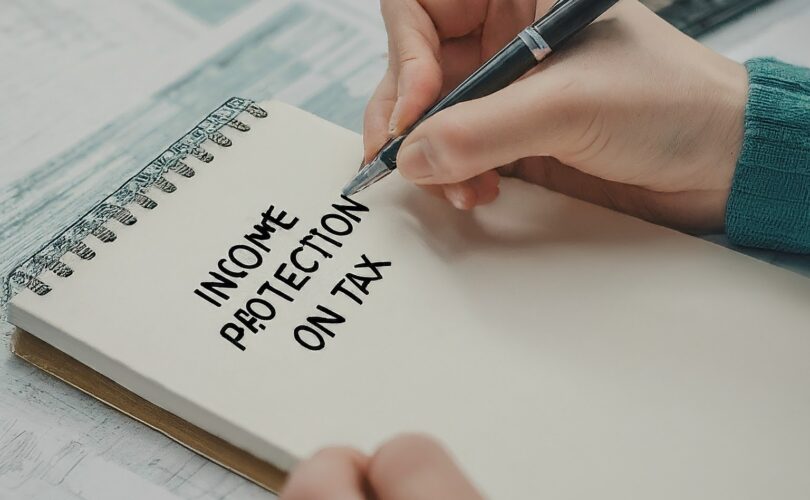Can you claim income protection on tax? This is a question that comes with a high level of uncertainty. Due to this, many individuals are unsure concerning the tax implication of their income protection insurance policy.
By design, income protection insurance provides financial support in the event that a person is unable to work as a result of illness or injury. It provides a monthly income to assist in covering your living expenses since you are unable to earn a regular income. Due to this, this form of insurance becomes a lifeline during difficult times as it would provide you with peace of mind knowing that you have a safety net.
Advantages of Income Protection Insurance
Financial security is the primary benefit of income protection insurance. In case you are not able to work because of injury or illness, the policy kicks in and you get provided with a monthly income. Due to the security, you get to cover your living expenses like mortgage or rent payments, bills, and other financial obligations.
Apart from the security it offers, the policy also covers a wide range of illnesses and injuries. This means that you get a cover for multiple types of illnesses, whether serious or mild, and temporary injuries.
Can You Claim Income Protection on Tax
Can you claim income protection on your taxes? Yes, you can claim income protection on tax but it would depend on the country and jurisdiction where you reside in. The tax treatment of income protection varies, hence you need to understand the specific rules and regulations in your local area in order to get a comprehensive answer.
Apart from location, whether receiving benefits or paying premiums is also a factor. Concerning receiving income protection benefits, one has to include them as income in the tax return. Doing so would mean that you would be taxed at the normal income tax rate. In these countries, taxes are paid on the monthly income you receive from the policy.

For paying premiums, most nations allow the premiums paid for income protection to be tax-deductible. This means that you can reduce your taxable income by the amount of the premiums you have paid. Claiming the premiums you pay as a deduction on your tax return, you get to reduce your taxable income. This leads to a major tax saving for policyholders.
If you live in Canada and receive income protection payments due to an illness, you would have to include those payments as income in your tax return. For a person in New Zealand, this would not be the case.
Regarding claiming income protection premiums as tax deductions, if you live in Australia and pay premiums for an income protection policy, you can deduct the premiums from your taxable income. This would lower the tax bill. For a person living in the United States and paying for the same policy, the deductibility would be dependent on your specific situation and state tax laws.
Income Protection Insurance Premiums Deductibility
You can save a major amount on your taxes if you are from a nation where income protection premiums are tax-deductible. Claiming premiums as a deduction, you get to reduce the taxable income and in turn lower the amount of taxes that you owe.
In order to claim the deduction, you would have to provide documentation showing the premiums that have been paid for your income protection insurance policy. This includes receipts or statements from the insurance provider. Hence, it is important to keep correct records of the premium payments to be certain of a smooth tax filing process.
Determining Income Protection Insurance on Tax Claiming Eligibility
For you to be eligible to claim income protection insurance on your taxes, you need to have a policy in place. Also, the necessary specific requirements that have been set by the local tax authority need to be met. With the requirements varying, it is important to make an effort and familiarize yourself with guidelines in your jurisdiction.

In most cases, you have to demonstrate the premiums paid for the income protection insurance are directly related to your ability to earn an income. This means that the policy must cover a situation where you are unable to work either due to illness or injury.
Claiming Income Protection Insurance on Tax
Claiming income protection insurance on taxes usually entails including the relevant information on your annual tax return. You have to provide details concerning your policy, including the premiums paid and any benefits payments that have been received during the tax year.
Related Article: How Much Money is 40 Quarters
When completing your tax return, consult the instructions that have been provided by the local tax authority. They will outline the specific steps that you need to take in order to claim the deductions or report the benefits payments accurately.
In case you are not sure about how to proceed, it is best to seek assistance from a tax professional who will guide you through the process.
Requirements for Claiming Income Protection Insurance on Tax
In claiming income protection insurance on your taxes, you would be required to provide supporting documentation. This documentation includes:
- Premium payment receipts– Keep records of the premiums that you have paid for your income protection insurance policy. The receipts would serve as evidence in time of claiming the deduction.
- Policy documents – Since the income protection insurance policy documents contain crucial information that is required when filing your taxes, you need to have access to them. The documents would outline the coverage, premiums, and terms of the policy.
- Benefit payment statements – In case you receive any benefit payments from the income protection insurance policy, you need to keep a record of the statements. These statements would be necessary when reporting the income on the tax return, should it be taxable.
Tax Saving Likelihood
Claiming income protection insurance on your taxes has the potential to result in significant tax savings. By deducting your premiums, you get to reduce the taxable income, which may lower the overall tax liability. The exact amount of savings would be dependent on the tax bracket and the paid premiums.
On the same subject, it is crucial to note that tax laws change over time hence you need to stay updated on any changes that have the ability to affect the deductibility of income protection insurance premiums. Due to this, it would be a good idea to consult with a tax professional as you would take full advantage of any available deductions or credits.
Misconceptions about Claimant on Income Protection Insurance on Tax
Among the key misconceptions surrounding the tax implications of income protection insurance is that all income protection insurance policies are tax-deductible. This is not the case as it varies depending on the jurisdiction.
The belief is that premiums are tax deductible and the benefit payments you receive are tax-free. In some cases, benefit payments would be considered taxable income. This is even if the premiums are deductible.
Final Remarks
Whether or not you can claim income protection on tax is dependent on your location and whether you are receiving benefits or paying premiums. In the United States, income protection insurance for individual taxpayers is not tax-deductible. This is something that you ought to keep in mind. You also need to remember that it is a good idea to consult a tax professional or certified accountant to provide personalized advice based on your specific circumstances. This would also help you to avoid any surprises in times of tax.








